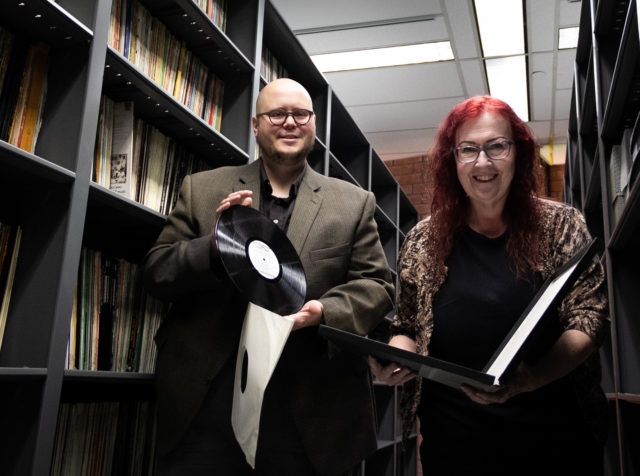The UCLA Ethnomusicology Archive will return with a new sound.
The archive is an audiovisual library where scholars have been able to submit materials such as field recordings and interviews from their research. The changes will provide space for more research to be added and will also be accessible to all students. To celebrate their reopening Friday, the Herb Alpert School of Music will host “Documenting the Sounds of Africa,” an event which will also honor Professor Jacqueline Cogdell DjeDje, who was director of the archive from 2000 to 2007. DjeDje’s research is on West African music, which will be featured in the symposium and concert by UCLA’s Music of West Africa Ensemble, Afro-Cuban Ensemble and Wondem Band at the Jan Popper Theater.
“We have a lot of really great African collections because that’s always been such a strong part of ethnomusicology,” said adjunct assistant professor of ethnomusicology and archivist-librarian Maureen Russell. “From the beginning, we’ve had faculty and students and ensembles mainly focusing on West Africa, and other parts of Africa.”
The performances during the celebratory event will encompass different musical styles from Africa, some of which are represented in the archive’s collections. For example, a group of students will play drums from Ghana made specifically for UCLA. Aaron Bittel, adjunct associate professor in the department and an ethnomusicology archivist-librarian, said the drums are historically important because they were commissioned by Mantle Hood, the founder of the ethnomusicology department.
“Documenting the Sounds of Africa” will also feature an open house that showcases the renovated archive rooms. The archive went under construction at the beginning of 2018 to expand the space so more collections could be implemented. Since the updates, all the collections have been moved to a separate room with high-density shelving as well as a viewing room for students and faculty to listen to recordings of the collections. Currently, there are more than 150,000 documents and recordings of music from around the world. However, Russell said she believes there is still room to grow and hopes for the archive to include more research in currently lacking areas.
“We don’t have really strong holdings in South America because nobody was really working with South America,” she said. “On the other hand, we have the earliest known recordings of rural Mexican music.”
The expansion will allow the archive to continuously develop and grow. Chair of the Ethnomusicology department at UCLA, Mark Kligman, said the department is influential in ethnomusicology as a whole, with the archive playing an important role in preserving and documenting music traditions.
“UCLA (has) the largest department in ethnomusicology and in some ways was very much a part of the beginning with some of the main scholars that shaped the field who were graduates and teachers at UCLA, and the archive is a record of all this great material,” Kligman said.
Dexter Story, the frontman for Wondem Band and a graduate African studies student, said he wants to fuse his studies with his musical compositions through his research with the department. He said he believes the archive can be a resource for all students because it contains collections from renowned researchers and musicians.
“I think that this archive is very necessary for our work; UCLA is so lucky to have this reopening reinvigorated,” he said. “It’s filled with richness and treasures and it could be so wonderful for students.”
Along with being a space for students to research and have access to a wide variety of collections, Bittel said he hopes the archive becomes a place where students and faculty can interact outside the classroom.
“We’re also planning to do a lot of programming, a lot of events, performances, film screenings and talks, and so that’s part of this configuration too,” said Bittel. “When we planned this space there is this big open area and this can actually be a small concert space.”

